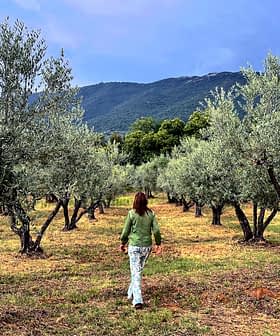Protesters Demand Aid for Olive Growers
The Orange Vests movement organized a demonstration in Rome to ask the government ad hoc measures for the Apulian and national olive oil sector.
A large demonstration of farmers organized by the newly established Orange Vests movement took place in Rome last week.
On February 14, olive growers and other agricultural workers from all over Italy banded together to call upon the Italian government to rapidly implement “concrete measures and actions” for the Apulian and national olive oil sector, which “was brought to its knees by last winter’s frost, the outbreak of Xylella fastidiosa and political laxity.”
It was the victory of a united people, of men and women who love their land and their work. Synergy won, olive growers won.
“On this day, we wanted to symbolically show our love for the land, inviting members of the parliament and ministers to take their share of responsibilities toward thousands of people, farmers and workers, who are facing many unresolved issues,” the spokesman for the Orange Vests movement, Onofrio Spagnoletti Zeuli, said.
The movement began in late December, when a group of Apulian olive growers from different associations organized to protest the Italian government’s failure to introduce a series of measures in the national budget, which were deemed necessary to support the agricultural sector, and in a subsequent decree that contained simplifying provisions for companies.
According to the Orange Vests, the immediate need was for the recognition of a state of emergency after the frosts of February 2018, targeted and decisive actions against Xylella fastidiosa in Puglia and the release of the resources of the Apulian rural development plan, which has been hampered by bureaucratic issues.
“This movement was initiated as a response to the inaction of the national and regional governments,” Spagnoletti Zeuli said. “Our purpose was to create a great peaceful apolitical mobilization of olive growers and farmers, with no flag but the Italian tricolor. Similarly, we urge the political representatives to work together, independently of their party, and collaborate with us, for the recovery of the sector and the future of thousands of families.”
As early as January, the Orange Vests took to the streets in Bari and, a few days before the national rally, they had organized events in Bitonto, Ruvo di Puglia, Corato, Andria, Bisceglie and Terlizzi.
The protest of the Apulian farmers’ movement culminated in Rome, where they were joined by colleagues from other Italian regions, including members of the Associazione frantoiani di Puglia (Association of Apulian Millers), Cia (Italian Farmers Confederation), Confagricoltura, Confocooperative, Copagri, Italia olivicola, Legacoop, Movimento nazionale agricoltura (National Agriculture Movement), Unapol, and Liberi agricoltori (Free Farmers).
Also, regional sections of trade unions CGIL, CISL, and UIL, the National Association of Italian Municipalities, the Order of Agronomists, and the Regional Organization of Land Surveyors attended the event wearing an orange jacket.
The organizer of the demonstration emphasized how “the adhesion of the municipalities and the workers’ unions shows that the problem does not only concern the olive oil sector and the agriculture of Puglia, but the whole economic, productive and social system of the region, and therefore of the country.”
“We want to draw attention to various points that constitute crucial issues for us as quality producers,” Elia Pellegrino, an olive grower and master miller from Andria, said. “Not only problems due to frosts and Xylella but also matters relating to land improvement consortia, fraud, the EU Common Agricultural Policy, as well as the revisiting of the law against gang-master practices, should be at the heart of the national political agenda.”
“We are here, today, to give a message of dignity and hope in the future for the Apulian and Italian olive oil sector,” the Apulian farmer added.
At the end of the demonstration, which was attended by thousands of people, the organizers said they were satisfied with the results that they obtained.
“Minister of Agriculture Gian Marco Centinaio, Undersecretary Alessandra Pesce and all the government have made a strong commitment, and now we look forward to the two emergency decrees on Xylella and the frost emergency,” Spagnoletti Zeuli said. “We are waiting for the Minister, who will come to Puglia on February 26, and the first concrete results.”
“The Minister agreed with our action program, and he thanked us for the important contribution to the Xylella decree approved in the State-Regions conference, since the measures for affected farms and mills that we requested have been included,” the spokesman added. “For the frosts, our proposal of a decree law went through, and with respect to the employment crisis due to working days lost, by February 26, an inter-ministerial table conference will be convened at the Ministry of Economic Development, while Undersecretary Pesce is already working for the new national olive growing strategic plan.”
“It was the victory of a united people, of men and women who love their land and their work,” Spagnoletti Zeuli continued. “Synergy won, olive growers won.”









